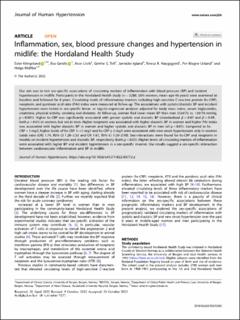Inflammation, sex, blood pressure changes and hypertension in midlife: the Hordaland Health Study
Kringeland, Ester Anne; Gerdts, Eva; Ulvik, Arve; Tell, Grethe S.; Igland, Jannicke; Haugsgjerd, Teresa Risan; Ueland, Per Magne; Midtbø, Helga Bergljot
Journal article, Peer reviewed
Published version

View/
Date
2023Metadata
Show full item recordCollections
- Department of Clinical Science [2375]
- Registrations from Cristin [10186]
Original version
Journal of Human Hypertension. 2023, 37, 718–725. https://doi.org/10.1038/s41371-022-00772-zAbstract
Our aim was to test sex-specific associations of circulating markers of inflammation with blood pressure (BP) and incident hypertension in midlife. Participants in the Hordaland Health study (n = 3280, 56% women, mean age 48 years) were examined at baseline and followed for 6 years. Circulating levels of inflammatory markers including high-sensitive C-reactive protein (hs-CRP), neopterin, and pyridoxic acid ratio (PAr) index were measured at follow-up. The associations with systolic/diastolic BP and incident hypertension were tested in sex-specific linear- or logistic-regression analyses adjusted for body mass index, serum triglycerides, creatinine, physical activity, smoking and diabetes. At follow-up, women had lower mean BP than men (124/72 vs. 130/78 mmHg, p < 0.001). Higher hs-CRP was significantly associated with greater systolic and diastolic BP (standardized β = 0.07 and β = 0.09, both p < 0.01) in women, but not in men. Higher neopterin was associated with higher diastolic BP in women and higher PAr index was associated with higher diastolic BP in women and higher systolic and diastolic BP in men (all p < 0.01). Compared to hs-CRP < 1 mg/l, higher levels of hs-CRP 1–<3 mg/l and hs-CRP ≥ 3 mg/l were associated with new-onset hypertension only in women (odds ratio (OR) 1.74, 95% CI 1.20–2.53 and OR 1.87, 95% CI 1.20–2.90). Sex-interactions were found for hs-CRP and neopterin in models on incident hypertension and diastolic BP, respectively (both p < 0.05). Higher levels of circulating markers of inflammation were associated with higher BP and incident hypertension in a sex-specific manner. Our results suggest a sex-specific interaction between cardiovascular inflammation and BP in midlife.
